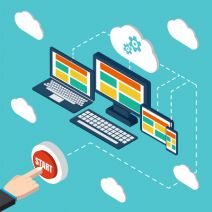 Everyone in your organization has a specific set of mission-critical software titles that they need to fulfill their day-to-day responsibilities, and the business owner is no exception. As an end-user yourself, how often do you worry about your software’s licenses? You wouldn’t believe how many organizations lose time and money due to expired licenses, or fall victim to hackers selling compromised copies of software to unsuspecting folks. What are the consequences of either of these circumstances?
Everyone in your organization has a specific set of mission-critical software titles that they need to fulfill their day-to-day responsibilities, and the business owner is no exception. As an end-user yourself, how often do you worry about your software’s licenses? You wouldn’t believe how many organizations lose time and money due to expired licenses, or fall victim to hackers selling compromised copies of software to unsuspecting folks. What are the consequences of either of these circumstances?
What Are the Consequences of Software Piracy?
Believe it or not, software piracy happens way more often than you might think in the professional environment. This is primarily due to the high up-front costs associated with purchasing mission-critical software. Due to software being a digital product, it can easily be stolen, replicated, or altered, all for hackers to make some money off of someone else’s work. These same hackers might offer their pirated versions of software for discounted prices, and they often try to spread threats through networks with the infected software.
In other words, you don’t have to consciously be aware of the fact that you’re purchasing pirated or stolen copies of the software. While you might know better than to purchase software through an unknown party, do your employees know how dangerous this can be? A study performed by research firm IDC, the National University of Singapore, and Microsoft’s Digital Crimes Unit, states, “pirated software infected with malware was projected to cost enterprises $126.9 billion worldwide in 2014, $22 billion in North America alone.” This means that your employees, thinking only to increase their own productivity, could unintentionally put your budget at risk.
What Happens with Expired Software Licenses?
Some software licenses are extremely sensitive to expiration dates, and immediately become unusable when their time is up. While this might not seem like a big deal, what if this happens in the middle of the workday? Losing access to software like this could be the difference between missing an important deadline on a project and finishing it in a timely manner. In order to ensure maximum productivity and efficiency in the office, you need to ensure that you’re always conscious of when your software licenses must be renewed.
One way you can avoid this is by organizing all of your software licenses so that they need to be renewed either on or around the same date. This makes it much easier to remember to do so, considering you’re only remembering one date rather than several.
Whose Reputation is at Stake?
Naturally, it’s not just your business that has to worry about pirated software. If anything, it’s most detrimental to the software manufacturers. They’re not making money off of pirated copies, and users who are contracting viruses or malware infections might blame the manufacturer for their poor products. Besides this fact, using compromised or stolen software, even unintentionally, has dire consequences. According to CyberTrend, “Many employees in big companies believe that if they steal a program behind a firewall, they may never be found. But many developers have tracking systems that identify who their visitors are and what they’re viewing.” Thus, even if you’re unaware that a program is counterfeit or stolen, you can expect to be held liable for using it.
Reviewing and upgrading your software licenses is something that absolutely has to be done in order to optimize your workplace efficiency; yet, some businesses find it more difficult to accomplish this goal than it should be. Outsourcing this responsibility to Bardissi Enterprises can greatly increase your chances of avoiding a software licensing dilemma. Our professional IT technicians can procure software solutions for your organization, and remotely monitor and maintain them to ensure they’re working as intended. Give us a call at (215) 853-2266 to learn more.
